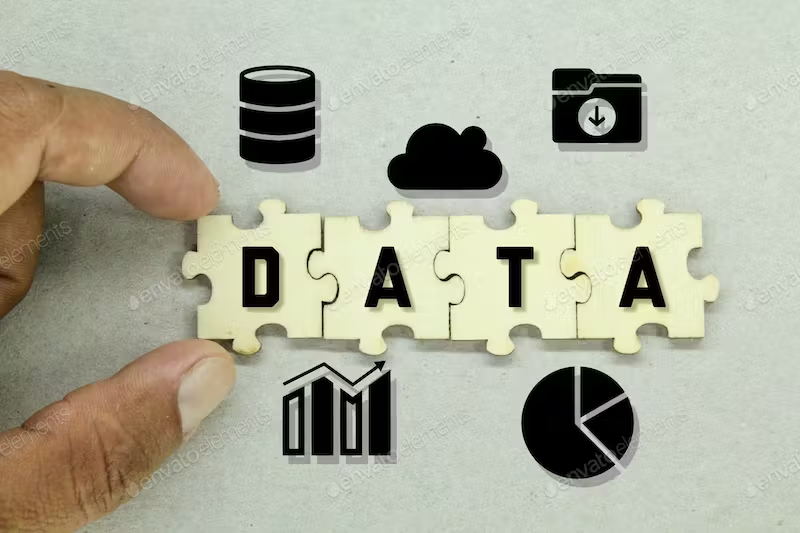Data Science, pivotal in the digital era, intricately employs scientific methods to extract meaningful insights from structured and unstructured data, profoundly influencing various industries by enhancing decision-making and strategic planning. Utilizing machine learning and statistical analysis techniques, data scientists unveil patterns within data, facilitating organizations in making informed, data-driven decisions. Data Science has become essential, fostering innovation and strategic development across diverse global business sectors.
This article aims to illuminate the path for aspiring data scientists, providing a roadmap from foundational learning to establishing a thriving career.
Understanding the Core Concepts of Data Science
Key Disciplines within Data Science
Data Science intertwines various disciplines, including Statistics and Mathematics for data analysis, Programming for implementing algorithms, Machine Learning for predictive modeling, and Data Visualization to represent findings effectively.
Essential Tools and Technologies
- Programming Languages: Python and R are pivotal due to their extensive libraries and community support.
- Data Visualization Tools: Tools like Tableau and Power BI facilitate the translation of data insights into comprehensible visuals.
- Machine Learning Libraries: Scikit-learn and TensorFlow are instrumental in developing predictive models.
The Significance of Big Data
Big Data, characterized by its immense volume, velocity, and variety, necessitates the expertise of data scientists to effectively manage and analyze the copious amounts of information it encompasses. Data scientists deploy a range of analytical strategies and technological tools to extract meaningful insights from these large datasets, converting raw data into actionable intelligence. Consequently, this enables organizations to make strategically sound decisions, optimize operations, and predict trends, ensuring they remain competitive and resilient in their respective markets.
Educational Pathways to Data Science
- Formal Education
Undergraduate and PG in data science and related fields lay a solid foundation by imparting essential theoretical knowledge and practical skills, enabling individuals to analyze and utilize data in various industry applications adeptly. This formal education, encompassing key areas like data analysis and machine learning, prepares aspirants for the multifaceted challenges in the data-centric professional world.
- Online Courses and Certifications
Platforms like Great Learning, Coursera, and Udacity offer specialized courses and certifications, enabling focused learning in specific data science areas.
- Bootcamps and Workshops
Participating in bootcamps and workshops provides hands-on experience and practical skills essential for real-world applications.
- Continuous Learning
The ever-evolving realm of data science demands continuous learning from professionals to keep up with advancements in technologies and methodologies. Ensuring skills remain relevant, ongoing development enables data scientists to adeptly navigate and exploit new tools and approaches in the data-centric landscape.
Developing Practical Skills and Gaining Experience
- Working on Personal Projects
Participating in Kaggle competitions and sharing projects on GitHub allows aspiring data scientists to practically apply, showcase, and visibly present their skills, building a comprehensive portfolio demonstrating their analytical and coding expertise to the data science community and potential employers.
- Internships and Entry-Level Positions
Securing internships and entry-level positions affords emerging data scientists practical application of theoretical knowledge and valuable insight into professional workflows and industry operations. This initial experience bridges academic learning with practical, industry-relevant applications and collaboration.
- Networking and Community Participation
Engaging in forums, conferences, and meetups enables budding data scientists to network with professionals and glean career-shaping insights while staying updated on the latest industry trends and opportunities. This active participation ensures they remain relevant and well-positioned in the ever-evolving data science field.
Navigating the Data Science Job Market
- Understanding Different Roles
Differentiating between roles like Data Analysts, Data Scientists, and Machine Learning Engineers is crucial for aligning one’s career path with specific skills and interests, as each role encompasses unique responsibilities and expertise in data interpretation, model creation, and algorithm development respectively. Recognizing these distinctions aids in effectively targeting educational and developmental efforts, ensuring preparedness and proficiency in the chosen data science specialization.
- Crafting an Effective Resume and Portfolio
Creating a compelling resume and portfolio requires succinctly showcasing your data science skills, projects, and achievements, highlighting your technical expertise and problem-solving capabilities to potential employers. This strategic presentation enhances your marketability and appeal in the competitive job landscape.
- Preparing for Data Science Interviews
Preparing for technical and behavioral interviews involves honing your ability to showcase your data science expertise and effectively communicate your problem-solving process. Demonstrating your collaborative skills and ability to work cohesively within a team becomes pivotal in illustrating your fit within an organizational culture.
- Negotiating Offers
Evaluate and negotiate job offers to secure positions that offer growth, learning, and alignment with your career aspirations.
Building a Successful Career in Data Science
- Continuous Skill Development
Embracing continuous learning and understanding applied data science programs ensures data professionals remain adept and relevant amidst the evolving technological and methodological landscape, supporting career adaptability and effectiveness in the dynamic data-centric environment.
- Career Progression and Specialization
Identifying specialization areas that align with personal interests and industry demand ensures a career path in data science that is both personally fulfilling and professionally relevant. This strategic alignment enhances employability by ensuring skills remain pertinent in the evolving market.
- Balancing Technical Expertise and Business Acumen
Cultivating business acumen and technical expertise allows data scientists to convert data insights into strategic business actions, ensuring organizational alignment and enhancing the impact of data-driven decisions. This blend of skills facilitates effective communication and application of data insights in a business environment.
- Mentoring and Leadership
Participating in mentoring and leadership within the data science community fosters collective growth and personal development by facilitating knowledge sharing, expanding networks, and refining leadership skills, mutually elevating the individual and the community.
Challenges and Solutions in a Data Science Career
- Addressing Ethical Considerations
Adhering to ethical guidelines ensures responsible data management and usage, safeguarding against misuse, and maintaining data science’s credibility and ethical standards. This practice inherently respects privacy and ensures integrity in data analysis and reporting.
- Managing Data Privacy and Security
Stringent data privacy and security measures, including encryption and access controls, safeguard sensitive information from breaches and unauthorized access, fostering trust and compliance with regulations.
- Navigating Remote and Hybrid Work
Develop effective strategies to manage remote and hybrid work, ensuring communication and collaboration.
- Ensuring Work-Life Balance
Adopt practices that ensure work-life balance and mitigate stress to sustain a healthy and productive career.
Conclusion
Embarking on a data science career entails continuous learning, practical application, and strategic career planning. With a plethora of opportunities and a continually evolving landscape, data science offers a rewarding and impactful career to those who navigate it adeptly. Explore books, online platforms, and communities that provide resources, insights, and support throughout your data science career journey.








